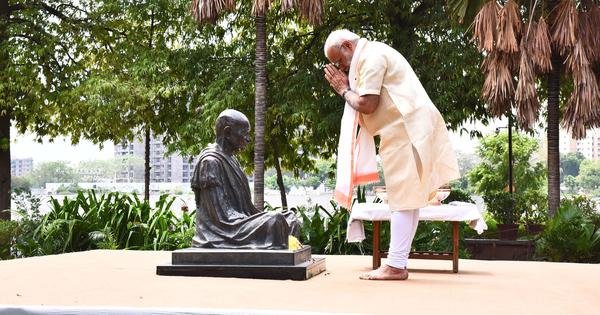Supreme Court Rejects Tushar Gandhi’s Plea Against Sabarmati Ashram Redevelopment
Delay in Petition Filing Leads to Dismissal

On Tuesday, the Supreme Court dismissed a petition by Mahatma Gandhi’s great-grandson, Tushar Gandhi, challenging the Gujarat government’s Sabarmati Ashram redevelopment plans. The court cited a 2.5-year delay in filing the petition following the Gujarat High Court’s 2022 decision to dismiss Tushar Gandhi’s plea.
Sabarmati Ashram: A Century-Old Landmark
Mahatma Gandhi established the Sabarmati Ashram, also known as the Gandhi Ashram, in Ahmedabad in 1917.
Redevelopment Project: Concerns Expressed
Tushar Gandhi argued in his petition that the Gujarat government’s proposed Rs 1,200 crore redevelopment project would “alter the topography of the century-old ashram” and “corrupt its ethos”. The plea mentioned that over 40 buildings would be preserved, while roughly 200 others would be destroyed or rebuilt.
Supreme Court’s Ruling
The Supreme Court stated that fearing the ashram’s main area might be affected, despite the state government’s assurance, was not a valid reason to challenge the order. In 2022, the Gujarat High Court accepted the state government’s assurance that the existing ashram structure would not be “disturbed, altered, or changed”.
Gujarat High Court’s Perspective
The Gujarat High Court believed that “the proposed project would promote Mahatma Gandhi’s ideas and philosophy, benefiting society and mankind”.
Opposition to the Redevelopment Plan
In 2021, over 130 prominent personalities, including filmmaker Anand Patwardhan, historians Ramachandra Guha and Rajmohan Gandhi, retired High Court Justice AP Shah, writer Nayantara Sahgal, journalist P Sainath, and carnatic singer TM Krishna, opposed the Sabarmati Ashram redevelopment plan. They warned that the most authentic monument of Mahatma Gandhi and India’s freedom struggle would be lost to “vanity and commercialisation” once the plan was implemented.



